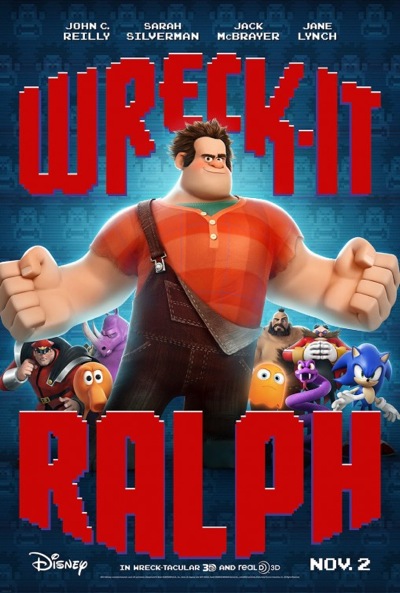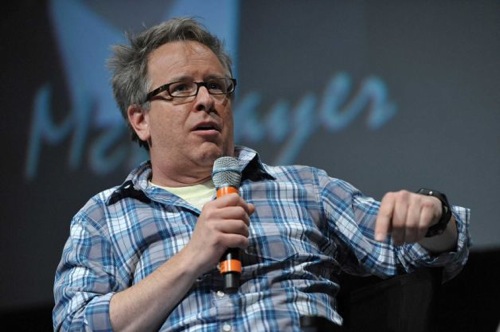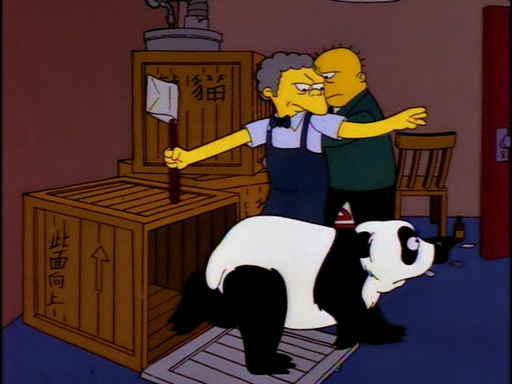
WRECK-IT RALPH is a movie for every kid who ever a) pumped a week's allowance into PAC-MAN in search of high-score immortality, b) spent a beautiful summer day indoors trying to conquer METROID, c) wearily greeted dawn after a long night's HALO session, or d) all of the above. It's not a straight-up adaptation of a popular game (which, as we all know, pales in comparison to actually playing the game), but a semi-serious consideration of the existential agony that might plague a character forced to go through the same pixilated motions every day.
What if Donkey Kong got tired of tossing barrels, and decided to make a home in JUNGLE HUNT? That's essentially the conundrum facing Wreck-It Ralph (voice of John C. Reilly), whose entire life has been dedicated to the random destruction of a quaint apartment building in a game called FIX-IT FELIX, JR. His task is inevitably thwarted by the titular character (Jack McBrayer), which leads to Ralph being tossed off the top of the building by its sweet, defenseless denizens. And when the arcade shuts down for the evening, Ralph returns home to his pile of rubble, while the rest of the characters party down in the structure he'll be dutifully smashing again in the morning.
Part of the fun of WRECK-IT RALPH is in the after-hours depiction of the arcade, where characters from other games congregate in surge protectors or, perhaps, head over to TAPPER for an ice cold root beer. This is where director Rich Moore gets to unleash the irreverent visual imagination he brought to so many classic episodes of THE SIMPSONS, THE CRITIC and FUTURAMA (only three of the greatest TV comedies ever). The difference here, of course, is that he's got the boundless resources of Walt Disney Animation at his disposal. As expected, the various game environments (particularly the militaristic HERO'S DUTY and the candy-colored SUGAR RUSH) are bursting with detail; there's so much going on in any given shot, you'll need multiple viewings to process it all.
But it's not all showmanship. There's a good deal of heart as well, and that's what matters most to Moore. When I spoke with Moore a couple of weeks ago, he cited the "relatable" problems faced by his two main characters, Ralph and SUGAR RUSH outcast Vanellope von Schweetz (Sarah Silverman), as key to making this more than just a cameo-filled celebration of gaming. This was the first time I'd talked to Moore since interviewing him in a muscle car on the floor of the 2007 San Diego Comic Con, and it was a blast to catch up. He's a great guy, and a tremendous talent. We're extremely lucky to have an artist like him developing movies for an industry titan like Disney. (And one of these days, I'm going to grill him about one of my all-time favorite episodes of THE SIMPSONS, "Cape Feare".)

Mr. Beaks: When I talked to you last [in 2007], FUTURAMA was just coming back. I know these animated films take a long time to develop. Was WRECK-IT RALPH on the horizon at that point?
Rich Moore: I started at Disney in November of 2008, so it's been about four years working on this project. We literally finished the sound mix, the last nail in the coffin, last Tuesday, so it's been about three-and-a-half years of work on it.
Beaks: Did you come in with Lasseter?
Moore: Yeah. We're old friends. Andrew Stanton and I went to school together, and through Andrew I knew John from Pixar. There had always been an unofficial/official outstanding invitation that "If you want to come up north and work [at Pixar], the door is always open." It was one of those things that, whenever I would talk to Andrew about it, something else was just starting to happen, whether it was THE SIMPSONS, FUTURAMA or THE CRITIC. So there was this moment where I was wondering, "What's next?" in my professional life, and that merger had happened between Pixar and Disney. And Andrew and John called up and said, "This is not the 'Come to Pixar' call. This is the 'Come to Disney call!' We're in Burbank now, so how about coming in and developing some ideas and directing a movie?" How do you say no to that? You'd be crazy to turn that down, and I'm not a crazy man.
Beaks: Well...
Moore: (Laughs) Yeah, maybe. But when I came in, John likes to hear a few different pitches on movies that they'd like to do. And he said, "By the way, the studio has been trying to crack a video game movie for quite some time." This was from before the time that they had merged, like from the '90s. And John said, "We just put one on the shelf again last year because we couldn't figure out a story worth telling. So if you'd like, I'd love for you to consider one of your pitches a story about video games." Again, how do you turn that down? John Lasseter is asking me to consider developing the video game movie - and I love games. So that was the genesis of it. And then coming up with a story that would be about a character in a game instead of just being about games. A character with a relatable problem, with a relatable situation; this notion of "What is life about? Is this it? Do I do the same thing I was made for for all eternity, where these people don't appreciate what I do?" So it was taking this relatable human situation, and putting it in this big, fantastical world: that's what really inspired me with the story. And it was a story that I was able to develop apart from any development that had been done on any of these video game ideas that they'd had before. I told John, "I don't want to be influenced by what these guys did before, so if I could just start from this notion of games, that'd be great."
Beaks: Given your history with THE SIMPSONS, THE CRITIC and FUTURAMA, was there a certain degree of irreverence they were hoping to get from you?
Moore: I would say that John recognized that my sensibilities would be a good pairing with that topic. You don't want to tell a story about video games with the same sensibility you'd tell THE PRINCESS AND THE FROG or THE LITTLE MERMAID. It's about a contemporary thing, so it should have a sensibility that sits well with that subject matter. No one ever said, "Be irreverent!" It was just, "Be yourself. Make this something that is wholly your own, that comes from the heart." John would say, "I know it's going to be funny, but where does the heart of the film lie? Between what two characters, and why do we care about them? And why do we want our main character to have what he's searching for?" These are the things that John would stress as we were working on the idea. But there was never a directive to "Make sure it's edgy." He knew what he was going to get.
Beaks: How many of your favorite characters from your gaming past were you able to work into the movie?
Moore: Just the vibe of the arcade in the movie is very similar to one that I used to frequent, called Golf N Stuff in Ventura. It's not an exact duplicate, but it definitely evokes that time period and the look of those arcades. I look at those scenes in the arcade, and I swear I smell root beer, popcorn and stale hot dogs. It really feels to me like those places. It was fantastic to be able to work with characters from games I played as a kid, and have them working together. Seeing them all together in one spot, in one movie, was really cool. It's almost a little surreal, and hard to wrap my head around the fact that all that time that was spent pumping quarters and tokens into machines, or playing at home on an Atari or Xbox or Nintendo 64 or Dreamcast... it all paid off! People were always saying, "You are wasting your life! Why are you going to that arcade?" It was research! Research long in the process!
Beaks: And those skills never leave you! I got here early for the interview, and they have a bunch of vintage games down in the hospitality suite. I saw the high score on MARIO BROS., and I was like, "I've got twenty minutes? I can break that."
Moore: (Laughs) "Yeah, still got it."
Beaks: Yeah, that felt good. But I love all of the nods to a few lesser-known games in your movie, like TAPPER. And TAPPER has that whole history with the Budweiser branding and the switch to ROOT BEER TAPPER for kids.
Moore: We had to take some liberties, because I loved the cabinet from the original TAPPER, and I liked the design of the original TAPPER. But we had to make it root beer. It's not like these guys are sitting around drinking beer. (Laughs) They're asking for root beer.
Beaks: Although the root beer seems to have an intoxicating effect on these guys.
Moore: Yeah, they seem to get a little looped. But I made little changes there because I love the original one. There's something so funny about it, with the brass rail on the floor. We took that one liberty with it, so I hope you'll forgive me. (Laughs) I just love that it's a game about slinging beers, and people getting mad.
Beaks: You're basically trying to rid your establishment of customers, which seems a questionable business practice.
Moore: It's very strange. And for the longest time I didn't realize you could collect the tips! "Oh, you can go get that money!"
Beaks: But that's perilous!
Moore: Because there's another glass coming. Is it worth getting the tip?
Beaks: I also noticed the BURGER TIME gang in the movie. Did you ever think about having them hang out at a BURGER TIME diner?
Moore: Oh yeah. We would often wonder "What's BURGER TIME's world like?" You've got scaffolding and patties hanging around. There were a lot of people on the story staff who were fans of BURGER TIME, and they were always like, "We've got to get BURGER TIME in there!" It was important to me that... I always liked how in the game, the chef's hat had an "H" on it. But then all the cabinet art, when he was painted more like a real man, he had a "P" on his hat - which was for Peter Pepper, the character's name. It was just so weird. I was like, "Why in the game does he have an 'H', and on the cabinet a 'P'?" So when we see him in TAPPER on the screen, he's got the "H", but when we see him realistically, he's got the "P".
Beaks: I'm interested in the balance you strike between the two primary game environments: HERO'S DUTY and SUGAR RUSH. On one hand, you have something very guy-oriented, and on the other that girls would be interested in. Was there a conscious effort to strike that kind of balance?
Moore: It wasn't something where I said, "I want something for guys and something for girls." My background is from THE SIMPSONS, where we were always encouraged to play to the whole audience - to kids as well as adults. So we'd do stories about Lisa, we'd do stories about Bart, stories about Marge and stories about Homer. There was always something to appeal to everyone. So when I see these animated movies that skew more towards girls or boys, I feel like that's a missed opportunity. Why are we playing just to very young kids, instead of adults or teenagers? I like things that are inclusive. When I was growing up, I liked shows and movies where everyone got the jokes. I loved Looney Tunes because it seemed like there was something for my brother, who was older, and something for me. And I thought, "Someday, I'm going to get what he's laughing at, but for now I'll take the guy getting hit on the head."
In a movie about video games, I could see where it would skew way more male than female, that there wouldn't be so many things for girls to enjoy. So there was an element to SUGAR RUSH of... not making it girly, but just a little more fun coming out of HERO'S DUTY, which is so hardcore. It's saying to the audience, "For those of you who aren't hardcore action gamers, we've got this, too. But for those of you who like your violence and aggressive shooting games, don't worry. This Cy-Bug is going to replicate in SUGAR RUSH and tear the world apart!" (Laughs) I like to give the audience what they want. I like making the audience happy. And right away, I told my producer, "This is going to have a PG rating. I don't think we can make a video game movie, and have it be rated G. It will be aggressive, it will be dark at times, there will be action and it will be tense." To me, that's what the games are about. They're not just nice and playful. They're very competitive and tense. And they said right from the front, "Okay, that's fine. PG it is."
Beaks: I love Alan Tudyk as King Candy. His voice work is wonderful. Was there any type of voice he was trying to specifically pull off, because I swear I can hear the Charlie-in-the-Box from RUDOLPH THE RED-NOSED REINDEER? It's just a tad more malevolent.
Moore: (Laughs) Yeah, there's a little bit of that. We started with Ed Wynn, who's an old-school comedian/actor. He did a lot of Disney movies and animation. He was in MARY POPPINS and BABES IN TOYLAND. He was one of these go-to guys for Disney. He came from vaudeville, for god's sake, so he was around way back when. But he had that happy chuckle, and it hasn't been done in such a long time. So when I was creating the character with my head-of-story and dear old friend Jim Reardon, I said, "Wouldn't it be cool to have this King character be like Ed Wynn? Who's heard that in fifty years?" So we started with that and explained it to Alan, who loves that kind of thing. He was like, "Ed Wynn? Oh yes. (Imitating Wynn) You mean the guy who loves to laugh?" But what's great about Alan is that he's not going to just do an imitation of Ed Wynn; he's going to make it his own thing. So he said, "I'm throwing a little Ruth Gordon in there, and also a little Charles Fleischer." It's like he's making a broth or a bouillabaisse. It just becomes its own thing, where, for me, the voice is coming out of that cartoon character, not Alan. I just can't imagine a human being speaking those lines - and I was there with him when he recorded it. (Laughs) It is one of my favorite villains ever.
How can you turn down a movie with a psychotic Ed Wynn? You can't, which is why you'll be seeing WRECK-IT RALPH when it opens this Friday, November 2nd.
Faithfully submitted,

